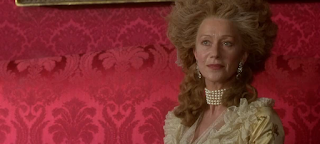Um envelhecido Rei George II da Inglaterra (Nigel Hawthorne) está mostrando sinais de loucura, um problema pouco compreendido em 1788. Enquanto o monarca alterna momentos de confusão e ataques violentos de temperamento, seus médicos tentam todas as curas que aparecem. Enquanto isso, a Rainha Charlotte (Helen Mirren) e o primeiro ministro William Pitt o jovem (Julian Wadham) tentam evitar que os inimigos políticos do rei, liderados pelo Príncipe de Gales (Rupert Everett, de usurparem o trono.
 |
| Helen Mirren as Queen Charlotte |
Director Nicholas Hytner
Writer Alan Bennett (play "The Madness of George III")
Stars: Nigel Hawthorne, Helen Mirren, Rupert Graves, Jim Carter. Ian Holm, Rupert Everett.
Won 3 BAFTAS and 1 Oscar for Best Art Direction
Subtitles - English, Português, Español
Copyright owner is blocking in these territories
Puerto Rico, U.S. Outlying Islands, U.S. Virgin Islands, United States. Sorry, Yankee Doodles!
Many historians believe that George III's mental state was caused by porphyria, a metabolic imbalance that can cause blue urine. However, recent research into his written correspondence suggests bouts of mania, and a common type of medicine at the time could have caused blue urine, leading some to conclude that he had a psychiatric illness.
This movie made Sir Nigel Hawthorne the first openly gay actor nominated for an Academy Award. (While promoting the film, he was "outed" by controversial activist Peter Tatchell.) Actors who later admitted or were later confirmed to be gay had been nominated, but he was the first actor who was already "out" at the time. He was frustrated that it was all the American interviewers wanted to discuss, rather than this movie or the nomination.
When Willis first restrains King George III in the restraint chair, the music that plays is George Frideric Handel's "Zadok The Priest", commissioned for King George II, and performed during his and every subsequent coronation. As the music reaches its climax, the King is fully restrained in the "throne", with a leather strap around his forehead resembling a crown. The music establishes the restraint scene as a mock coronation.
This movie is based on a play by Alan Bennett called "The Madness of George III". An urban legend formed that the title was changed to prevent non-British audiences from mistaking it for a sequel to two other movies about "The Madness of George". Nicholas Hytner clarified that in the U.K. it would be obvious that "George III" was a King, but it might not be so clear elsewhere, hence the name change. That does not rule out the sequel theory, as the numeral III was not mentioned by Hytner.



No comments:
Post a Comment